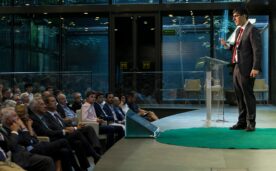Consequences of the Trump Administration's trade and foreign policies
Summary:
On 6 September 2018, the Rafael del Pino Foundation and the Círculo de Empresarios organised a conference by Jesús Fernández Villaverde, Professor of Economics at the University of Pennsylvania, entitled "Consequences of the Trump Administration's trade and foreign policy". According to Fernández Villaverde, this policy has brought about a revolution in the United States' international and trade relations with the rest of the world. A revolution that is as profound as the four previous ones experienced by this US policy: 1914, after the outbreak of the First World War; 1941, following the United States' entry into the Second World War; 1989, as a consequence of the fall of the Berlin Wall and the end of the Cold War; and 2001, after the attacks of 11 September. The current revolution represents a break with the basic structures of international relations and trade that the United States had built up since 1944 at the Bretton Woods Conference. This revolution can be explained by ideological, economic and structural factors. In the ideological sphere, the ghosts of America's past are returning, and Steve Bannon, who was White House chief strategist for the first seven months of Donald Trump's presidency, is one of the people who has most influenced its return. Central to Bannon's thinking is that America was built on the American system of protecting industry and controlling the financial system to help it. That system is based on the ideas of the nineteenth-century American statesman Henry Clay, which rested on three pillars: a protective tariff (25%) for American industry, control of the financial system to finance American industry, and a major infrastructure investment plan. These are also the fundamental pillars of Trump's programme. In the specific case of tariffs, they became very low after Bretton Woods. The Trump administration is very unhappy about this. Clay's ideological framework is completed by two other ideas of a political nature: a highly trained military and domestic nationalism. This is also what Donald Trump wants to do. In the political sphere, the ideas of James Polk, President of the United States from 1845 to 1849, also predominate. Its essential elements are a strong distrust of the East Coast elites, a working-class, white, rural electoral base and a very aggressive foreign policy. A policy again very similar to that of the Trump Administration whose consequences were the US-Mexico war. As a result of their defeat, the Mexicans had to cede half of their territory, including the states of California, Nevada, Utah, Arizona, New Mexico, Wyoming and Texas, to the Americans. In addition, territorial tensions between the US and its neighbours were exacerbated. What Trump is doing, consequently, has happened before. Trump is using it to build his foreign and trade policy. As far as the conjunctural factors are concerned, the first thing to bear in mind is that Trump wins the nomination because of the internal problems of the Republican Party: weariness with the Bush saga, the fact that Jeb Bush did not want to run, Marco Rubio was not ready, ... Secondly, it should be borne in mind that, in the United States, rarely does a party win three presidential elections in a row. The only case in the 20th century was the victory of Bush senior after Ronald Reagan's eight-year presidency. The economy, moreover, had grown little in the previous years. All this played in favour of Trump's victory. In fact, the prediction model of Ray Fair of Yale University said that a Republican candidate, without naming names, would have won 56% of the vote, indicating that the ground was paved for a Republican victory. Despite this, Trump only got 49% of the vote. Finally, Hillary Clinton was a horrendous candidate, both strategically and tactically, and made major mistakes that cost her victory. As for structural factors, four in particular stand out: demographic change, the rise of China, the revolution in the energy market and the wounds of the financial crisis. Demographic change means that there will be fewer and fewer white Americans and more and more Americans of other races, especially Latin Americans and Asians. This means that Europe will matter less and less to them. At the same time, China's arrival in international trade is much bigger than anyone imagined. In just one generation it has gone from contributing 5% of the world's industrial gross value added to 25%. China also accounts for 20% of the world's exports and has a large current account surplus. Well, Trump won the election in the territories most negatively affected by China. The big losers are non-Hispanic white people, with a high school education or less, over 50 years old, whose standard of living is 150% of the poverty level. This has had electoral consequences. On the energy front, fracking is a revolution, because it has made the United States the world's leading country in terms of oil and gas reserves. This has turned the US from an importer to an exporter of energy products. At the same time, the financial crisis has led to widespread dissatisfaction with the financial system. Moreover, it should be borne in mind that financial crises are very different from normal crises in their political and economic effects. In this case, it has led, among other things, to the emergence of populism, and it is very easy for populists to turn the international trading system into an enemy. In this election cycle, the financial crisis has been particularly vicious because of its concentrated effects. With all of the above, three theories have been constructed about Trump's strategy. The first says that his intention is to rebuild an international system different from the liberal one. The second says it is all about fighting hard for more profits. The third boils down to making things up as you go along. As a consequence, the institutions of the international system, such as the IMF, the World Bank or the World Trade Organisation, are going to be badly affected because the US has gone from being a cooperative to a non-cooperative actor. This is dangerous when a crisis hits. In addition, the collective security system will be affected, while confidence in the United States will be lost. From there, we do not know how big this trade war will be. In the worst case tariffs will rise from 5% to 30% or 60%. World GDP would fall by 2% or 3%, but welfare would fall by much more. Moreover, there will be a cost in terms of growth rate of a few tenths per year, with tremendous long-term effects. The risks of this situation for Europe lie in the areas of security and energy. In the case of energy, it is because the United States will no longer have an interest in striving to keep oil trade routes open. In relation to this, the Middle East would become less important for the US. China could face problems in international markets and could continue military escalation.
The Rafael del Pino Foundation is not responsible for the comments, opinions or statements made by the people who participate in its activities and which are expressed as a result of their inalienable right to freedom of expression and under their sole responsibility. The contents included in the summary of this conference are the result of the debates held at the meeting held for this purpose at the Foundation and are the responsibility of their authors.
The Rafael del Pino Foundation is not responsible for any comments, opinions or statements made by third parties. In this respect, the FRP is not obliged to monitor the views expressed by such third parties who participate in its activities and which are expressed as a result of their inalienable right to freedom of expression and under their own responsibility. The contents included in the summary of this conference are the result of the discussions that took place during the conference organised for this purpose at the Foundation and are the sole responsibility of its authors.









